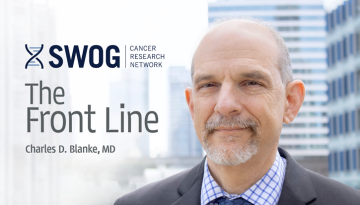Brain, Sarcoma Working Groups Debut
We’re still making scientific progress, despite the COVID-19 crisis, here at SWOG Cancer Research Network. I’m excited to report the official formation of two new research working groups – one for central nervous system cancers and one for sarcomas. Both groups are spinning out of our robust early therapeutics and rare cancers committee, and I expect them to be an important source of future innovation and cross-network collaboration.
Dr. Razelle Kurzrock runs the early therapeutics and rare cancers committee with vice chair Dr. Young Kwang Chae, who oversees translational medicine. Dr. Kurzrock calls the new working groups a “win-win-win” situation.
“This is good for everyone,” Kurzrock says. “It’s good for young and mid-career investigators, who get new leadership opportunities. It’s good for SWOG, which will get important new trials, and most of all, it’s good for patients with sarcomas and brain cancers, people who have very few treatment options for these rare diseases.”
The sarcoma working group is led by Dr. Lara Davis, an oncologist and investigator here at Oregon Health & Science University. Dr. Davis is well-known for her work in these connective tissue malignancies that are rare in adults but fairly common in children and teens. Sometimes curable with surgery, or a combination of surgery with chemotherapy and radiation, about half the cases are resistant to all these treatment approaches.
Dr. Davis says she wants to develop high impact sarcoma concepts within SWOG and effectively develop sarcoma-relevant trials across the NCTN. The Alliance has a sarcoma committee, as does Children’s Oncology Group. Dr. Davis and her team will work with these teams and participate in the NCTN’s sarcoma AYA working group, to champion and co-develop trials for cross-network enrollment.
No sarcoma concepts are actively in development. However, members will discuss the possibility of developing a trial that follows on the success of the angiosarcoma cohort tested in DART, or Dual Anti-CTLA-4 & Anti-PD-1 blockade in Rare Tumors, our immunotherapy trial devoted to rare cancers. We’ll have news on that cohort in a month or two. Stay tuned!
Dr. Manmeet Ahluwalia of Cleveland Clinic leads the CNS group, which will focus on primary brain and spinal cord tumors and brain metastases. There are more than 120 types of primary CNS tumors. The group will also pursue treatments for glioblastoma, Primary CNS Lymphoma, and other malignancies as well as metastases from breast, lung, and other cancers.
Dr. Ahluwalia notes the high need for better CNS cancer drugs. “Both Senators Kennedy and McCain died of glioblastoma, and there is only one approved drug for this type of cancer,” he says. “It’s a very desperate situation. And the cooperative groups can really make a difference here. Because many CNS cancers are rare, there isn’t a lot of money to be made in finding a new treatment. And studying rare tumors is notoriously difficult.”
The CNS team is developing a trial concept to study two monoclonal antibodies, rituximab and pembrolizumab, in Primary CNS Lymphoma, as well as a biomarker trial for glioblastoma.
The success of the DART trial, Dr. Ahluwalia said, gives investigators inspiration and optimism about studying rare tumors. Dr. Kurzrock agrees. DART is opened at 842 NCTN sites, and has successfully studied nearly 40 rare tumor cohorts. It also has nearly reached it enrollment goal of 818 patients – a feat many said wasn’t possible with rare tumors.
SWOG has already shown the cancer research community that we can successfully test new drugs in rare cancers, and I’m looking forward to proving this again, and again, and again.
Other Recent Stories



